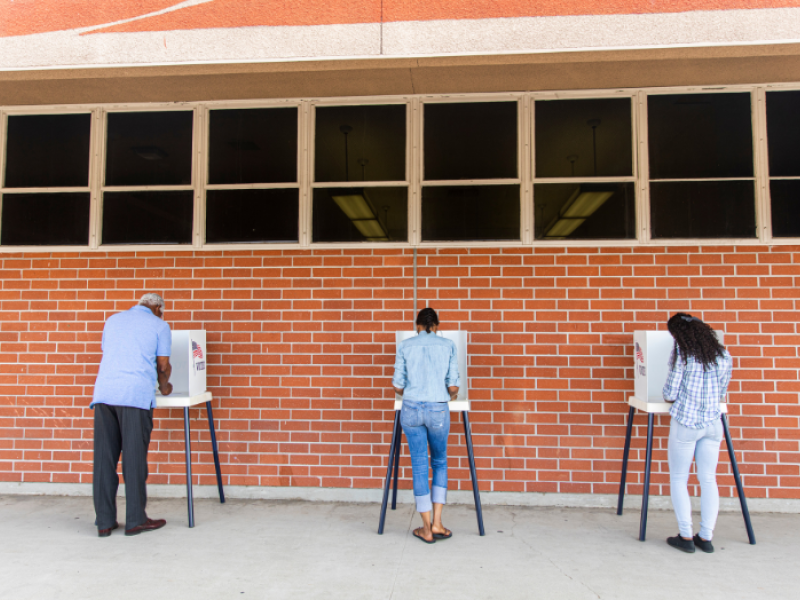
In the wake of last week's defeat of Democratic candidates across the country, an elite consensus has formed that blames Democrats' failures at the ballot box on their "wokeness." In attempting to address structural racial injustice, they argue, Democrats have become as inflexible and judgmental as those they are fighting against. They've become addicted to litmus tests and sloganeering (i.e., "defund the police") as a way to measure success.
On PBS NewsHour, longtime Democratic strategist James Carville blamed Democrats' losses on "stupid wokeness," arguing that "this 'defund the police' lunacy, this 'take Abraham Lincoln's name off of schools,' that — people see that." It's time for Democrats, said Carville, "to go to a woke detox center." Plenty of other columnists jumped on the 'detox' bandwagon, including The New York Times' Maureen Dowd, whose most recent column was headlined: "Wokeness Derails Democrats."
But, there is a chicken and the egg problem with these theories. Are Democrats losing because they are embracing progressive policies like critical race theory? Or are they losing because they are in charge in Washington and the economy and COVID remain significant concerns? Imagine for a moment that the progress we saw earlier this spring on COVID and the economy had continued unabated. Or if the administration had better handled the withdrawal of troops from Afghanistan. Do we think that President Biden's job approval rating would be in the low 40s? Probably not. Suppose Biden's job approval ratings were still at 53 percent this fall (as they had been earlier this summer). Do we really think that attacks on critical race theory would have been enough for a Republican to win in Virginia? I don't.
A recent Monmouth poll asked voters these very questions. By a seven-point margin, more voters said that the president's bigger problem was his inability to get Washington working (36 percent) than the party's leftward swing (29 percent). More critical, independent voters, "are more likely to point to capability (42%) than ideology (26%) as Biden's bigger problem."
In other words, the challenge for this administration is less about 'wokeness' than it is about competence. More specifically, rising inflation is a bigger threat to Democrats in 2022 than teaching about racism.
Poll after poll suggests that voters' biggest worries are the very things that Democrats haven't shown competence in delivering on. A late-October poll by Navigator Research (D) found that while 60 percent of Americans think the economy is a top issue for Pres. Biden and Congress to focus on, just 38 percent feel that the administration and Congress are focused on it.
In an early November poll, CNN asked voters if they thought Pres. Biden has had the right priorities, or if he hasn't paid enough attention to the country's most important problems. Just 42 percent said he had the right priorities, compared to 58 percent who said he wasn't focused enough on the most important challenges in front of the country; a 26 point swing in the negative direction since April when a majority (53 percent) thought he was focused on the correct priorities.
When many voters — especially independent voters — already soured and skeptical about Democrats' ability to handle the big challenges in front of the country, they are more open to arguments that the Democratic Party has lost its way on a host of other issues, including cultural ones. This isn't to say that voters only disapprove of critical race theory or defund the police now that Democrats are in charge. They've been unpopular with many swing voters all along. But, these topics have taken on more salience because Democrats have failed to do the big things well.
We often see this same dynamic in professional sports. When your team is winning, mistakes on the field or fissures within the organization are often overlooked or dismissed. But, when that team starts losing, we hear more about 'tensions' in the locker room or a coach's temper problems.
The administration is trying to bridge this gap between voters' experience with the economy and their work to solve it. At an event this week at the Port of Baltimore touting the recently passed infrastructure bill, Pres. Biden acknowledged that "consumer prices remain too high," but argued that "this bill [infrastructure legislation] is going to reduce the cost of goods to consumers and businesses," thereby helping to reduce the inflation rate. Cabinet and administration officials are flooding the airwaves, making a similar case that better infrastructure will help ease the supply chain clogs that they argue is the leading cause of rising prices.
But, with voters already spooked by rising prices (A recent CNBC poll found Americans expressing the "most pessimistic economic outlook in the poll's history"), will another trillion dollars plus spending bill ease or exacerbate those concerns? Democrats argue that the Build Back Better programs, like federal funding for child care, will reduce the strain on consumer pocketbooks. But, with a majority of Americans already disapproving of Biden's handling of the economy, that's going to be a tougher sell than it would have been back in June when he was getting higher marks. Meanwhile, Republicans have a more favorable environment to make the case that this legislation will only add to — not reduce — inflationary pressure. And, GOP groups like American Action Network have already started to seed the airwaves of competitive Democratic-held districts with these messages.
At the end of the day, the most important data point for 2022 is the consumer price index, not the number of "woke detox centers" opened by Democrats.

Subscribe Today
Our subscribers have first access to individual race pages for each House, Senate and Governors race, which will include race ratings (each race is rated on a seven-point scale) and a narrative analysis pertaining to that race.